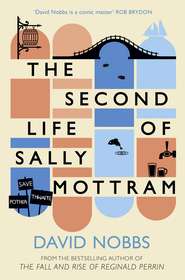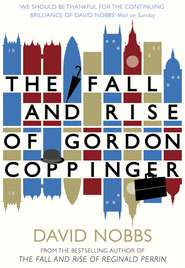По всем вопросам обращайтесь на: info@litportal.ru
(©) 2003-2024.
✖
It Had to Be You
Автор
Год написания книги
2018
Настройки чтения
Размер шрифта
Высота строк
Поля
He heard nothing for a couple of minutes and wondered if he’d been cut off. How hard it would be to ring back. Then Chuck’s voice came again, and he was catapulted into sorrow that it wasn’t Charlotte speaking and relief that somebody was and, strangely, almost into a feeling that Chuck was his friend.
‘Hi.’
‘Hi, Chuck.’
‘She says she has nothing to say to you. Sorry.’
How naive to have even dreamt that it would be easy.
‘Not your fault, Chuck. Chuck, is she all right? Is everything all right?’
‘Yeah, man. Cool. Everything’s cool.’
‘Good. Good. That’s good. Chuck, will you try again? Could you tell her for me that she may have nothing to say to me but I have something to say to her? Could you tell her that I agree with her that it’s a wicked world and that the values of our civilisation are fucking crap and will destroy our planet unless we do something about it pretty quickly?’
‘Wow. Cool, man.’
‘Thank you. I’m … um … I’m quoting her actually. Um … so would you say to her that because it’s such a wicked world it’s all the more important for people who love each other as much as her mother and I love her to stick together and support each other. We just want to see her, Chuck.’
Saying ‘we’ made him feel slightly better about making the call on his own.
‘Yeah. Right. Cool. Got that. Will do.’
It was five years since he’d heard his daughter’s voice. She had rung, once, about two years ago, to say she was all right, but it was Deborah who had answered. Charlotte had left them a phone number, but had said that she would disappear for ever if they rang except in emergencies. They had phoned when a favourite godmother died, but by that time Charlotte had moved on. He wondered how much of what she had experienced in those five years would be reflected in her voice. But, when the voice came, it was Chuck’s again.
‘Hi there. Sorry. No dice,’ he said.
James found himself nodding his head in acknowledgement that this was what he had expected, as if Chuck was in the room with him. He almost felt that Chuck was in the room with him.
‘Well, thank you for trying.’
‘No probs. Um …’
‘Yes?’
‘She didn’t sound angry. She didn’t say anything negative about you.’
‘Are you saying that that’s … surprising … unusual?’
‘Well, it is a bit, yeah. Sorry.’
‘No, no. Thank you. I …’ What? Nothing. This was all too difficult. ‘Well, thank you, Chuck. That’s something, I suppose.’
‘I think it might be.’
Chuck’s reply surprised James, but his own next remark surprised him even more. He found himself saying, ‘Chuck? Look after my baby.’
‘I do try, Mr Hollinghurst.’
‘Do you know something, Chuck? I actually believe you.’
As he’d talked to Chuck, James had almost felt relieved that he was talking about Charlotte rather than to her. But as soon as he had rung off he felt devastated that he had been so close to his daughter but still had not spoken to her.
He looked at his glass indecisively, then went to the gin bottle and added quite a slurp of gin, but no more Noilly Prat.
Why hadn’t he asked more? Why hadn’t he probed?
Because he sensed that of all the courses he could take, probing would annoy her the most. He would have to wait till she was ready.
If she was ever ready.
‘Oh, Debs, where are you?’ He realised that he had actually said the words out loud. He needed her there. He needed to tell her what was emerging as the most important, the most amazing point of all. Charlotte was alive and at least to a certain extent well and things were good enough to be described as cool and she was at the end of a telephone line and he knew the number and she was with a man and for no reason whatsoever and against all probability he trusted this man.
He tried to rehearse the words he would use, but no words fitted. ‘Debs, there’s great news.’ Well, was it ‘great’? Was that the word? ‘Debs, I’ve found Charlotte.’ Well, not entirely. The words would come when he saw her, the strength of her presence would dictate the words. He stood at the window and looked for her car as she tried to find a parking place. The roof would be down and her straw-coloured hair would be streaming behind her and he would pour her a drink and within minutes they would be talking about their beloved, lost daughter. He was amazed to find how clearly he imagined her, how deeply he needed her, at this visceral moment. He took several sips of his drink in his excitement. It was a long while since he had wanted to share anything with Deborah as much as he wanted to share this news. It was really annoying of her to be late this day of all days. It was the Irish in her. He drowned his irritation with another sip. This was no time to be irritated. This … conditional though it might be, strange though it might be, terrifying though it might still be … was joy.
He had completely forgotten Marcia’s remark about the police, but the moment the knock came, he remembered, and from the nature of the ring he knew that a policeman was calling. This ring said, ‘Hello. Police,’ not, ‘Sorry, darling, I’ve lost my key again,’ or, ‘Kathy and I wondered if you felt like popping to the pub for a quickie.’
And he suddenly knew, because the call could now not be about Charlotte, that it would be about Deborah, it would explain why she was late, something had happened.
As he walked towards the small entrance hall, James took a swallow of his drink and then hid the glass on the top of the piano behind the large photograph of Deborah and him on their wedding day twenty-four years ago.
The policeman looked absurdly young.
‘Good evening, sir,’ said the officer. ‘It’s … um … it’s about your wife. Does she drive …’ he looked down at his notes. ‘… a silver Renault Mégane hard-top convertible?’
‘You’d better come in.’
As he entered the living room, the policeman took off his helmet, revealing hair so close-cropped that he looked almost bald. He had the air of a man who had joined the force to bully members of the underclass, not to be offered a comfortable chair in a living room of the well-heeled.
‘What’s all this about, officer?’
‘I’m afraid your wife’s car has been involved in a serious accident, sir.’ He looked huge and wretched in his delicate chair. ‘I’m afraid the … um … the driver had no chance. I’m sorry.’
He had often dreamt of this moment, in his fantasies, often when half awake, sometimes even when lying beside her in bed. Deborah dying suddenly, without pain, leaving him free, free, free.
But this wasn’t fantasy. It wasn’t right that a man’s fantasy should suddenly become real. He was deeply shocked. He sat down heavily. He wondered if the officer could see into his thoughts – his dreadful thoughts.
Of course he hadn’t really wanted Deborah to die. Only in make-believe.
He was shocked that she had died.
But, the fact remained, he had dreamt of being free and now he was free.
He heard himself say, ‘Is there no chance, officer?’ and to him it was the voice of a man acting out the role of a grieving husband, and acting it badly. It was dreadful.
‘I wonder if you could get me a glass of water, officer,’ he said, to buy himself time. ‘The kitchen’s through there.’
‘Of course, sir.’











